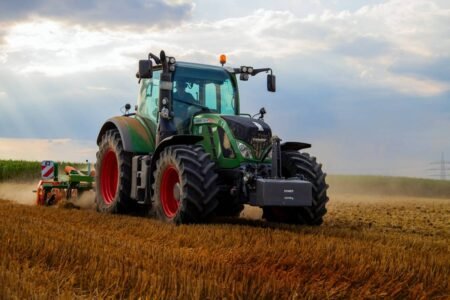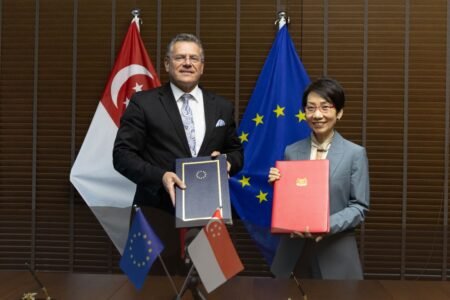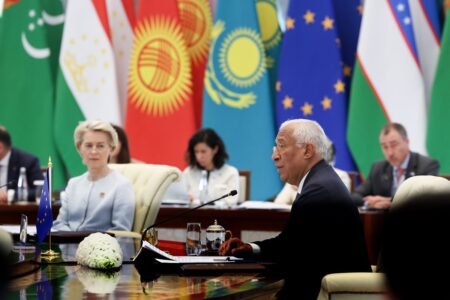By Council Decision 94/800/EC, the Council of the European Union adopts the legal texts resulting from the Uruguay Round multilateral trade negotiations concluded through the signature of the Marrakesh Final Act and the creation of the World Trade Organisation.
Advertisement
ACT
Council Decision 94/800/EC of 22 December 1994 concerning the conclusion on behalf of the European Community, with regard to matters within its competence, of the agreements reached in the Uruguay Round multilateral negotiations (1986-1994) [Official Journal L 336 of 23.12.1994]
SUMMARY
Final Act embodying the results of the Uruguay Round multilateral trade negotiations
Through this Decision, the Council adopts, on behalf of the European Community and with regard to matters within its competence, the results of the Uruguay Round negotiations embodied in the Marrakesh Final Act signed on 15 April 1994 in Morocco by the representatives of the European Community and the Member States.
The Marrakesh Final Act includes a list of multilateral and plurilateral agreements and ministerial decisions and declarations that clarify provisions of certain agreements. The multilateral trade agreements are the agreements in question and the associated legal instruments are an integral part of the WTO agreements and binding on all WTO members. As far as the plurilateral agreements are concerned, although they form part of the WTO agreements, they do not create obligations or rights for WTO members that have not accepted them (e.g. the Agreement on Government Procurement).
The agreement establishing the World Trade Organisation incorporates several annexes containing the WTO agreements. Annex 1A encompasses the multilateral agreements on trade in goods. These are:
the General Agreement on Tariffs and Trade 1994 (GATT 1994) (which included the GATT 1947);
the Agreement on Agriculture;
the Agreement on the Application of Sanitary and Phytosanitary Measures;
the Agreement on Textiles and Clothing;
the Agreement on Technical Barriers to Trade;
the Agreement on Trade-Related Investment Measures;
the Agreement on Anti-Dumping Measures;
the Agreement on Customs Valuation;
the Agreement on Preshipment Inspection;
the Agreement on Rules of Origin;
the Agreement on Import Licensing Procedures;
the Agreement on Subsidies and Countervailing Measures;
the Agreement on Safeguards.
Annex 1B of the WTO Agreement contains the General Agreement on Trade in Services (GATS) and Annex 1C consists of the Agreement on Trade-Related Aspects of Intellectual Property Rights (TRIPS), including trade in counterfeit goods.
Annex 2 incorporates the Understanding on Rules and Procedures Governing the Settlement of Disputes. Annex 3 relates to the mechanism for reviewing the trade policies of WTO members.
Finally, Annex 4 deals with the plurilateral trade agreements. These are:
the Agreement on Trade in Civil Aircraft;
the Agreement on Government Procurement;
the International Dairy Agreement;
the International Bovine Meat Agreement.
The last two agreements were repealed at the end of 1997.
Agreement establishing the World Trade Organisation (WTO)
This agreement provided a common institutional framework for the conduct of international trade relations within the context of the rules resulting from the agreements and legal instruments mentioned above.
Contrary to its predecessor (the GATT), the WTO is a permanent organisation which benefits from a legal personality and its attributes. All members of the GATT by rights became original members of the WTO on 1 January 1995. Since that date, applicants wishing to join have had to follow the accession procedure set out in the Agreement establishing the WTO.
The WTO members have set themselves the following objectives:
raising standards of living;
ensuring full employment and a growing volume of real income and effective demand;
expanding the production of and trade in goods and services;
sustainable development and protection of the environment;
taking account of the needs of developing countries.
The function of the WTO is to:
facilitate the implementation, administration and operation of the various trade agreements;
provide a forum for multilateral trade negotiations;
resolve trade disputes, through the Dispute Settlement Body (DSB);
review the national trade policies of its members;
cooperate with other international organisations in order to ensure greater coherence in global economic policy-making.
From a structural point of view, the WTO has a Ministerial Conference, its highest body, composed of representatives of all the member countries, which meets at least once every two years. In the interval between these meetings, the General Council, made up of representatives of all the members, carries out the functions of the WTO and supervises the operation of the agreements and ministerial decisions. The General Council also meets to discharge the responsibilities of the Dispute Settlement Body and the Trade Policy Review Body provided for in the Trade Policy Review Mechanism (TPRM).
The General Council has under its guidance three subsidiary bodies, the Council for Trade in Goods, the Council for Trade in Services and the Council for Trade-Related Aspects of Intellectual Property Rights. Committees that are dependent on the General Council but not on these three councils are also established, such as the committees on ‘trade and development’, ‘trade and the environment’ and ‘regional agreements’. Finally, two committees are responsible for administrating the two plurilateral agreements on trade in civil aircraft and government procurement.
The General Council appoints a Director-General, who is responsible for heading the Secretariat of the WTO.
In principle, the WTO takes its decisions by consensus. When a decision cannot be arrived at by consensus, decisions are taken by a majority of votes, each WTO member having one vote. The European Community, which is a full member of the WTO, has a number of votes equal to the number of its Member States, which are members of the WTO. The agreement stipulates that the number of votes of the EC and its Member States shall in no case exceed the number of the Member States of the EC.
Each member of the WTO may submit to the Ministerial Conference proposals to amend provisions of the WTO’s various multilateral trade agreements.
Understanding on Rules and Procedures Governing the Settlement of Disputes
The WTO’s dispute settlement system is an important element of the multilateral trading order. It is based on Articles XXII and XXIII of the GATT 1994 and on the rules and procedures subsequently drawn up and set out in the Understanding on Rules and Procedures Governing the Settlement of Disputes incorporated in the Agreement establishing the WTO.
The dispute settlement system covers all of the multilateral trade agreements. In fact, it applies to trade in goods, trade in services and intellectual property issues covered by the TRIPS Agreement. It also applies to disputes under the plurilateral Agreement on Government Procurement. Some of these agreements contain provisions concerning dispute settlement that only apply to disputes under the agreement in question and that may supplement or modify the rules of the Understanding.
The dispute settlement system is administered by a Dispute Settlement Body (DSB) set up by the Understanding. All WTO members may attend the DSB’s meetings. However, where the DSB is administering provisions relating to the settlement of disputes concerning a plurilateral trade agreement, only the members that are parties to the agreement will be able to participate in decisions or actions taken by the DSB with respect to disputes under that agreement.
The dispute settlement process is launched when one member submits to another a request for consultations on a specific issue. These consultations must begin within 30 days of the request. If the consultations fail to settle a dispute, a member may call on the DSB to set up a panel, usually consisting of three independent experts, in order to deal with the issue. In addition, the parties may voluntarily agree to make use of other dispute settlement methods, including good offices, conciliation and mediation.
After listening to the parties, the panel submits a report to the DSB. The panel must complete its work within six months or, in cases of urgency, within three months. The report is considered for adoption by the DSB 20 days after it has been circulated to members. Within 60 days of the date of circulation it is adopted, unless the DSB decides by consensus not to adopt the report (opposite or negative consensus), or if one of the parties notifies its decision to appeal.
Indeed, the WTO’s dispute settlement procedure enables all parties to a panel case to appeal. The appeal is, however, limited to issues of law covered in the panel report and legal interpretations developed by the panel. The appeal is examined by a standing Appellate Body composed of seven members appointed by the DSB for a four-year term. Three of the members serve on any one case. The Appellate Body’s report must be accepted unconditionally by the parties to the dispute and adopted by the DSB unless there is a negative consensus, in other words, a decision by consensus not to adopt the report.
The DSB keeps under surveillance the implementation of adopted recommendations or decisions, and all pending matters remain on the agenda of its meetings until they are resolved. Deadlines are also set for the implementation of recommendations set out in panel reports. When a party is unable to implement these recommendations within a reasonable period of time, it must enter into negotiations with the complaining party with a view to developing mutually acceptable compensation. If these negotiations are unsuccessful, the DSB may authorise the complaining party to suspend the application to the member concerned of concessions or obligations. Compensation and the suspension of concessions are, however, only temporary measures that may be applied until the DSB’s recommendations are implemented by the member concerned.
In all cases, WTO members agree that they will not determination themselves that there has been a violation of the obligations laid down within the framework of the WTO, nor suspend concessions. They must apply the rules and procedures for the settlement of disputes set out in the Understanding.
Furthermore, the Understanding on Rules and Procedures Governing the Settlement of Disputes recognises the special situation of the WTO’s developing country members and least developed country members. Developing countries may opt for an accelerated procedure, request extended deadlines or request additional legal aid. WTO members are encouraged to give particular consideration to the situation of developing country members.
Trade Policy Review Mechanism (TPRM)
The Trade Policy Review Mechanism (TPRM) was set up as a temporary measure under the GATT in 1989 following the mid-term review of the Uruguay Round. This mechanism is now an integral part of the WTO system and encompasses all the fields covered by the WTO agreements (goods, services and intellectual property questions).
The TPRM aims, in particular, to achieve greater transparency in, and understanding of, the trade policies and practices of WTO members, to encourage members to adhere to the rules in force in the multilateral trading system and, thus, to promote the smooth functioning of the system.
Within the framework of the TPRM, all WTO members are subject to review. This review is held every two years for the four members with the greatest share of world trade (currently the European Community, the United States, Japan and Canada), every four years for the next 16 members and every six years for the other members. A longer period may be set for least developed countries. In practice, a certain degree of flexibility has been introduced to the rate of reviews (up to a six-month interval). In 1996, it was agreed that every other review of each of the first four trading powers would be an interim review.
The review is carried out by the Trade Policy Review Body (TPRB) on the basis of a general policy declaration submitted by the member concerned and a report drawn up by the WTO Secretariat. In drawing up its report, the Secretariat seeks the support of the member concerned but retains full responsibility for the facts presented and views expressed. The Secretariat’s report and the member’s declaration are published following the review meeting, together with the minutes of the meeting and the text of the final comments made by the Chairman of the TPRB at the end of the meeting.
REFERENCES
Decision 94/800/EC – 22.12.1994 – OJ L 336 of 23.12.1994
RELATED ACTS
Communication from the Commission to the Council and to the European Parliament of 26 November 2003 – Reviving the DDA Negotiations – the EU Perspective [COM(2003) 734 final – Not published in the Official Journal].







